French language study trip to Paris
 Paris - the city of love - is not only an important center of art, culture, fashion and society, but also a popular destination for travel enthusiasts and students who want to refresh or improve their French language skills. Many renowned language schools based in Paris offer a wide range of French courses. The geographical proximity to Switzerland also makes short language trips to the vibrant capital of France a realistic option.
Paris - the city of love - is not only an important center of art, culture, fashion and society, but also a popular destination for travel enthusiasts and students who want to refresh or improve their French language skills. Many renowned language schools based in Paris offer a wide range of French courses. The geographical proximity to Switzerland also makes short language trips to the vibrant capital of France a realistic option.
Which language school in Paris is suitable?
When you start planning your language study trip to Paris, the first challenge is choosing a language school. A large number of prestigious international and local language schools offer an exciting and varied range of courses. It is not easy to find your bearings and make a decision. In order to find the right French school, a few points should be clarified in advance.
A language study trip to Paris will only bring the desired progress with the right language course. The courses offered by the various language schools in Paris are very individual. Some schools specialize in beginner courses, others focus more on advanced courses or offer diploma courses in preparation for the DELF (Diplôme d'Etudes de langue française) or DALF (Diplôme approfondi de langue française) examinations. Choosing the right course level is often decisive for learning success. Our free onlineLanguage placement testswill help you find the right course level. Some language schools run private courses or offer individual lessons by the hour to complement another course. Selected language course providers in Paris also organize courses that are very suitable for business people, as they are specifically aimed at people from individual sectors such as tourism or business. Some French course providers organize half-day courses that are followed by a leisure program. If you would like to discover Paris with a guide and in a group, you should definitely consider this course option.
The next crucial point when looking for the right language school in Paris is the location of the course center. If you are only planning a short language study trip, you should give preference to a central location, as trips to the center of Paris for sightseeing, going out and shopping are considerably less time-consuming. If you go to school in a central district, you can see much more of the city of love within a few days and even explore much of it on foot. This saves not only time but also the cost of transportation. If you are planning a longer language study trip, you will find beautiful and exciting districts with good language schools just outside the hustle and bustle of the big city. In less lively and less touristy districts, everyday life passes at a more leisurely pace. Here you can say hello in a café and soon find yourself in conversation with the locals. It is precisely because of such encounters and conversations that language stays are so valuable and beneficial for learning a foreign language.
When choosing the right language school in Paris, also compare the different timetables of the schools, the number and duration of lessons, the class sizes, the infrastructure, the course costs and the mix of nationalities. All of these are also important quality features and criteria that can speak for or against a school.
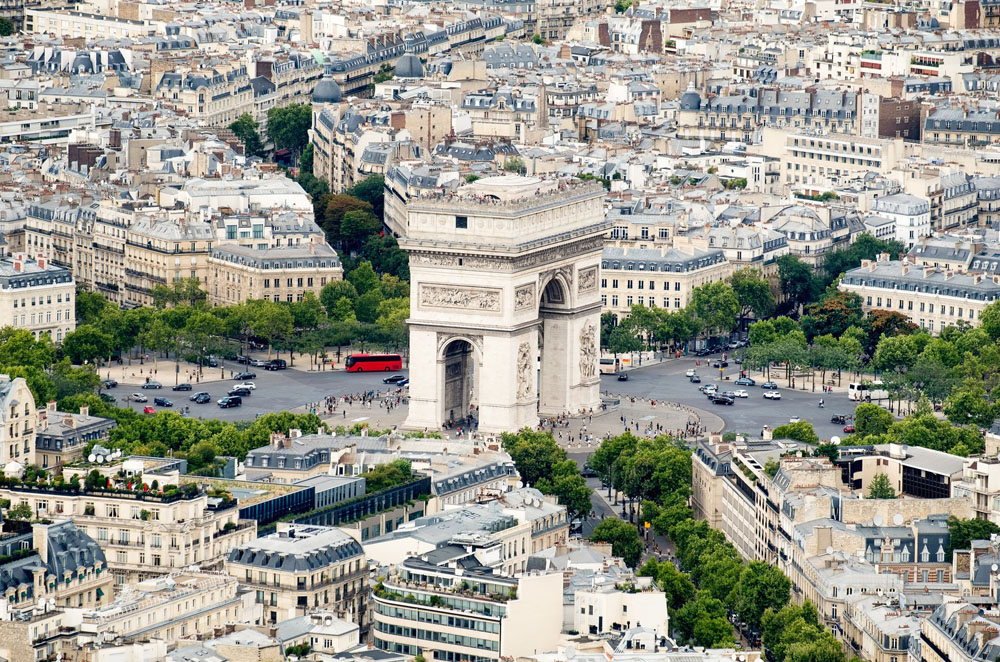
Ausbildung-Weiterbildung.ch offers you withField reportsFirst-hand information. Former Swiss language students report on their experiences during their language study trip to France. These reports will help you to set the right priorities when looking for the right language school in Paris. Online reviews of language schools in Paris are also very helpful. You can find these on Google itself if you do a search via Google Maps. Reviews on Facebook also offer insightful information from former language students about individual language schools.
You can also find more insightful information, tips and ideas for a language study trip to Paris in ourLanguage travel guide.
Which accommodation in Paris?
In the vast majority of cases, the language schools in Paris also offer accommodation of various kinds.
During language stays, language students often live with local host families. Everyday life with the local family gives guests the opportunity to immerse themselves even more deeply in the culture and language. Staying with a host family increases the value of a stay abroad in a priceless way. Language students gain a unique insight into local customs and benefit in many ways from good tips and information for their stay in Paris. The host families offer single or double rooms on request and breakfast, half board or full board can be booked for a small surcharge on top of the rental price.
Many language students would also like to live in a student residence or shared flat during their language study trip to Paris. In the vast majority of cases, the bathrooms are shared and the residents take care of the cooking together. If you prefer a private retreat, you can of course also look for accommodation in a small furnished apartment or studio before your language study trip. However, rental prices in Paris are very high. An apartment in Paris costs between 30 and 50 euros per square meter, depending on its proximity to the city center. In most cases, such apartments are only rented out if a minimum booking of a few weeks or months is agreed. This type of accommodation is therefore mainly suitable for long language stays.
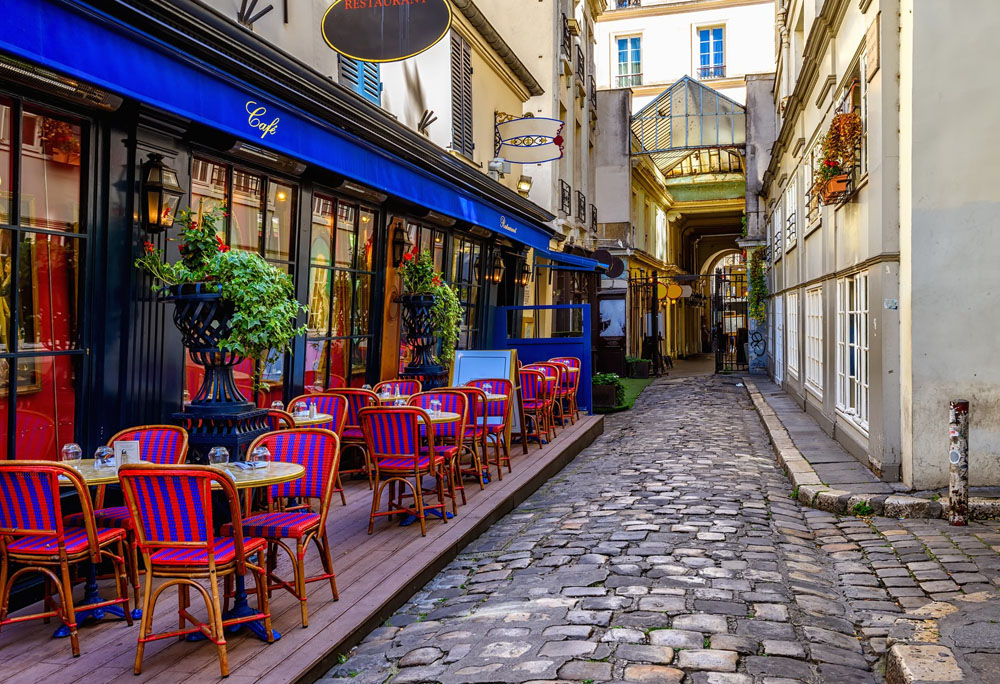
When looking for a place to stay in Paris, location naturally also plays an important role. Proximity to the chosen language school is also a decisive factor when booking your own accommodation. Also ask yourself what you would like to do in your free time in Paris and look at the transport connections and travel times between your home, the school, the center and the various excursion destinations, after all, you don't want to spend your precious days during your language study trip in Paris in the gloomy metro or in traffic. Sometimes it is more beneficial to accept a slightly higher rent if you can save time and money on commuting. If you want to stay with a host family, the language school will assign you to one and only give you the exact address when you arrive. The language schools promise different maximum commuting times between school and home (usually between 20 and 45 minutes - which is a wide range - so you should definitely check this in advance).
A very hip district that is very popular with students is the colorful and international Belleville in the northeast of Paris. The original working-class district has not yet been affected by the city's smog and has developed into a very popular trendy district in recent years. The food here is cheap and the bars are full of fun.
If you are unsure, the local language schools will be happy to provide you with information.
Where to party in Paris?
During a language study trip in the romantic city of Paris, there's also plenty going on at night. The city of lights never sleeps and the nightlife options during the language study trip are almost unlimited. Bars, nightclubs, theaters, opera and cabarets - there is something for every taste. But watch out: If you want to enjoy the nightlife in Paris, you need to have a big wallet. A 5-dl beer costs between 6 and 9 francs and entrance fees for nightclubs are around 12 francs. Many Parisians therefore go out a little earlier to take advantage of happy hour; between 6 p.m. and 7 p.m. as well as between 9 p.m. and 10 p.m., drinks are offered at half price in almost all bars in Paris.
Those who avoid the touristy areas will also spend less money when they go out. The alternative Oberkampf district or the Bastille district, for example, are very popular with party-loving locals. Anyone planning a longer language study trip to Paris will certainly appreciate these districts. Numerous bars and clubs with significantly lower prices can be found here. Valuable insider tips include Rue Muffetard, Rue de Lappe, Place de la Contrescarpe and Rue de Pot de Fer, which are all very close to each other.
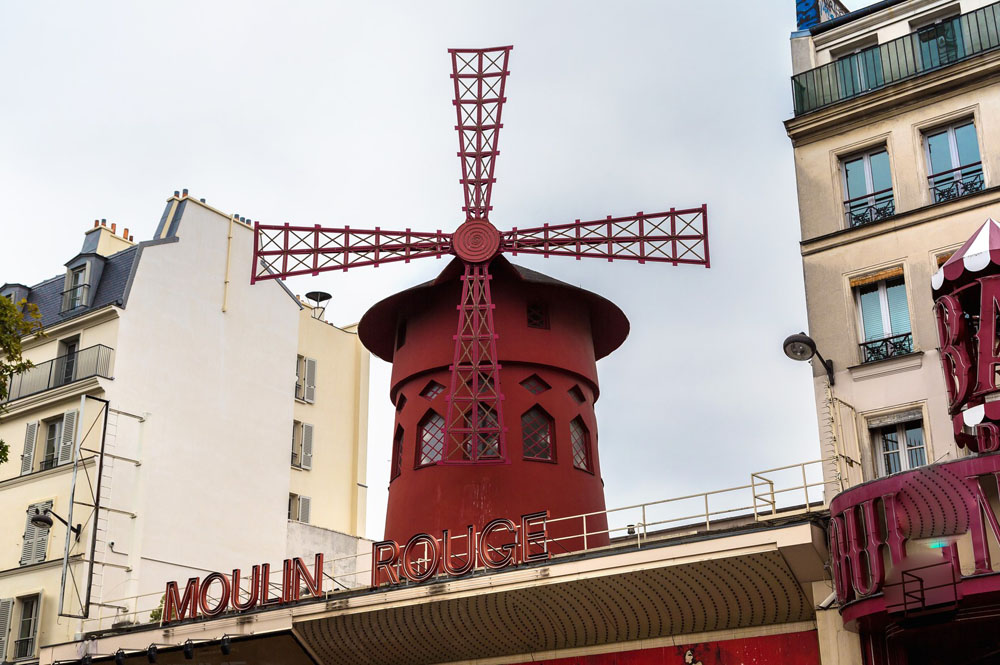
The lively streets surrounding the Moulin Rouge, the adjacent sex mile and the Place Pigalle in the infamous Montmartre district also offer all kinds of entertainment in the evening. But here too, prices are a little on the high side. Those who like things a little quieter in this district will appreciate a detour to the Rue des Toris Frères or the Rue des Abbesses. Party animals will love the Boulevard Rochechouart.
Theater is celebrated in Paris. The offer appeals to an incredibly wide audience, with numerous performances taking place daily in the various theaters - in French. This nightlife tip is therefore more suited to language students with an advanced knowledge of French. Anyone traveling to Paris for a language study trip will certainly enjoy visiting a cabaret or variety show, especially the famous Moulin Rouge. But the Crazy Horse and the Lido are also highly recommended venues.
On warm summer evenings, it's worth visiting one of the many cozy and romantic "beach bars" along the Seine.
What to experience in Paris
Which city in the world can compete with Paris when it comes to sightseeing? Probably none. The city has so much to offer that many people find it difficult to decide which sight or museum to visit first during their language study trip in Paris. We would like to introduce you to the most important sights here:
What was originally a temporary structure, built as a gateway to the 1889 World's Fair and was to be dismantled after 20 years, is now the symbol of Paris: the Eiffel Tower. You can reach the 324-metre-high Eiffel Tower via metro lines 6 and 9 or the RER C train. In good weather, it is possible to take the elevator to the 3rd floor for around 30 francs (young people up to the age of 24 around 15 francs), where a breathtaking view over the whole of Paris awaits you. If you only take the elevator to the 2nd floor, you pay about a third less. Sporty visitors can take the stairs for around 12 francs. A visit to the Eiffel Tower is certainly at the top of the to-do list during a language study trip to Paris.
Notre Dame is one of the first Gothic cathedrals in France and became the most popular sightseeing destination in Paris thanks to Victor Hugo's novel "The Hunchback of Notre Dame". To get to Notre Dame, you have to get off the Metro No. 4 at the Cité stop. The spectacular location on the Ile de la Cité (the Parisian city island) competes with the beautiful architecture of the cathedral.
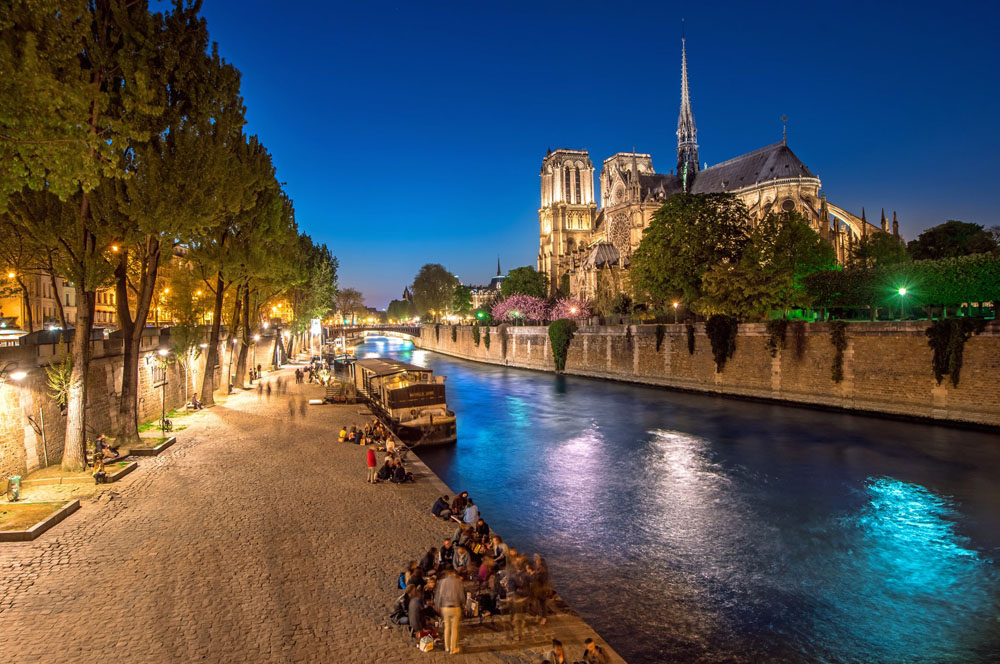
If you take Metro 2 and get off at the Anvers stop, you will find yourself on the northern Montmartre hill, where the famous Sacré Coeur basilica is enthroned, built at the turn of the century in the Roman-Byzantine style. The stones used in its construction are self-cleaning, so the Sacré Coeur always shines brightly over the city. Numerous people enjoy the view in the warm sunshine while sitting on the steps leading up to the basilica.
The two-kilometre Champs-Elysées is probably the most famous street in Paris and the finish line of the Tour de France. Shoppers and fashionistas like to linger here, as expensive and famous fashion boutiques and well-known international fashion stores are lined up door to door. So if you want to treat yourself to something nice, you'll find everything your heart desires here.
L'Arc de Triomphe, built at the beginning of the 19th century by Napoleon, adorns the upper end of the famous Champs-Elysées. The reason for its construction was Napoleon's promise to his army that they would return from the Battle of Austerlitz with triumphal arches. If you get off at the Charles de Gaulle Étoile train and metro station, you will find yourself right next to the Arc de Triomphe.
If you have a penchant for art, you should definitely not miss a visit to the Louvre Museum during your language study trip to Paris. In the former palace of the French king, the famous Mona Lisa by Da Vinci is on display alongside 40,000 other exhibits. The museum can be reached by getting off at the Palais-Royal-Musée du Louvre metro station of the same name. Admission costs around 15 francs, but is free for visitors under 26.
The world's most extensive Impressionist art collection is housed in the Musée d'Orsay, the former Paris train station that was shut down during the Second World War. World-famous works of art by Monet, Renoir and many other renowned artists can be admired here. The museum can be reached via the regional train at the Musée d'Orsay station.
The Centre Pompidou Museum is also an important address for lovers of art and culture. The modern art exhibition, temporary exhibitions, a cinema, a library, a restaurant and a café invite art and culture enthusiasts to linger.
The Panthéon is the burial place of over 70 famous Frenchmen such as Victor Hugo, Rousseau, Voltaire and many more. It is located on the hill of Sainte Geneviève.
Transportation in Paris
The metro is often used during a language study trip in Paris, as it takes you to all corners and districts of the city. A single journey costs around two francs, and it is also possible to change trains several times. Such single trips can also be purchased at kiosks and metro stations in booklets of ten for around 18 francs. Tickets must be presented at all times and must therefore be kept for the entire journey.
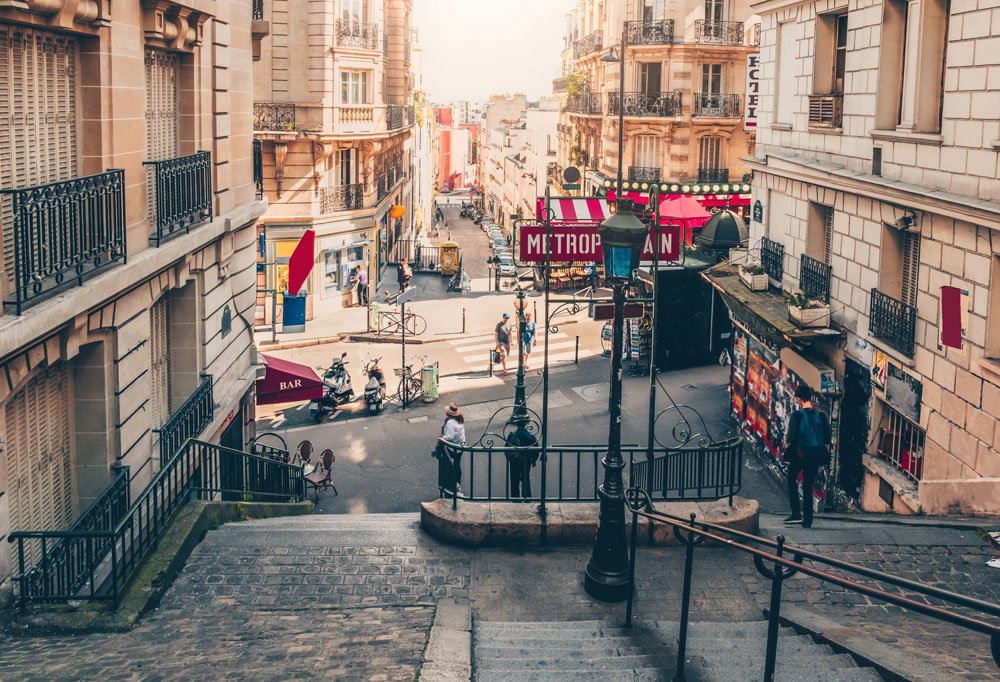
If you are booking a longer language study trip, you should preferably opt for the personal and non-transferable "Pass Navigo". This can be purchased for a week or even months and is valid indefinitely and varies in price depending on the routes and zones selected.
The regional train RER is also a popular transportation option within Paris. There are a total of five line networks (A, B, C, D, E) that connect the Paris suburbs with the city center. During a language study trip in Paris, lines A, B and C are mainly used. The RER runs a little earlier in the morning than the metro - the first trains leave before 5am. Transportation costs on the RER are roughly the same as metro tickets and are calculated according to the number of zones and cost around two francs per zone.
The buses in Paris mainly run in the city center. With single tickets, you can transfer from bus to bus, but not to the metro. Three bus lines also serve more remote locations such as the airport or important train stations.
The streetcar, with its eight lines, runs just outside the city center. Single tickets for the streetcar cannot be used for the metro or buses.
Day, multi-day, weekly, monthly or annual passes for the metro, RER, streetcar, Montmartre cable car and buses can also be purchased and are particularly worthwhile for longer language stays.
Although there are relatively few cabs on the road in Paris, the rides cost comparatively little. However, as soon as more than four people get in and if several pieces of luggage have to be transported, you pay a surcharge. Cab drivers can also refuse a ride if the direction is not on the cab's route. Free cabs can be recognized by the green light on the roof of the car.
Sports enthusiasts on a language study trip in Paris will enjoy the Velib bike rental stations, which can be found every 300 meters. For a deposit of 180 francs, bikes can be rented by credit card at one of the 1300 stations in Paris.
What you can afford in Paris
Paris is an expensive place to live. However, those who like to live and eat in non-touristy areas will be able to save quite a bit. On average, a full meal in a restaurant without drinks costs between 18 and 25 francs. A baguette costs 1.20 francs and a sandwich around 7 francs. The tourist sidehttps://de.parisinfo.comoffers exciting information - including tips for saving money in Paris.

A language stay for two weeks with a host family with breakfast and a language course of 20 lessons per week costs around CHF 1,300. This does not include transportation costs to and within Paris. And if you are already traveling to Paris for the language course, you will certainly want to go shopping and do some things. In total, you should therefore expect to pay at least 2,000 to 2,500 francs for a two-week language study trip in the above range. As soon as private lessons, more exclusive accommodation and other offers are added, the price rises even higher. Paris is certainly not the cheapest destination for a language study trip to learn French, but it is all the more exciting and impressive!
